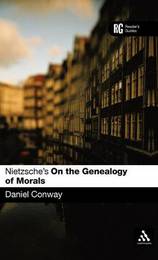
|
Nietzsche's 'On the Genealogy of Morals': A Reader's Guide
Hardback
Main Details
| Title |
Nietzsche's 'On the Genealogy of Morals': A Reader's Guide
|
| Authors and Contributors |
By (author) Daniel Conway
|
| Series | Reader's Guides |
|---|
| Physical Properties |
| Format:Hardback | | Pages:198 | | Dimensions(mm): Height 216,Width 138 |
|
| Category/Genre | Ethics and moral philosophy |
|---|
| ISBN/Barcode |
9780826478160
|
| Classifications | Dewey:170 |
|---|
| Audience | |
|---|
|
Publishing Details |
| Publisher |
Bloomsbury Publishing PLC
|
| Imprint |
Continuum International Publishing Group Ltd.
|
| Publication Date |
15 May 2008 |
| Publication Country |
United Kingdom
|
Description
Nietzsche is one of the most important and widely read philosophers of all time and his On the Genealogy of Morals is one of the most frequently studied of all his works-a key text in the study of moral philosophy. In Nietzsche's "On the Genealogy of Morals": A Reader's Guide, Daniel Conway explains the philosophical background against which the book was written, the wider context of Western morality in general and the key themes and topics inherent in the text.
Author Biography
Daniel Conway is Professor and Head of Philosophy and Humanities at Texas A&M University, USA, having previously held faculty appointments at Pennsylvania State University, Stanford and Harvard.
Reviews'Daniel Conway, one of the leading Nietzsche scholars of his generation, has written what may be the best extended commentary on The Geneaology of Morals. Students will not be the sole beneficiaries of Conway's clearly written and insightful discussion...Highly recommended for anyone interested in what Nietzsche has to say about the origins and future of morality and the ascetic ideal.' Professor Michael Zimmerman, University of Colorado at Boulder, USA 'This is a pedagogical tour de force - I admire the way Daniel Conway has written this introduction to Nietzsche's classic text with the needs of students uppermost in mind. It should be the first place undergraduates go to as an aid to their study of the text.' Keith Ansell-Pearson, Professor of Philosophy, University of Warwick, UK.
|